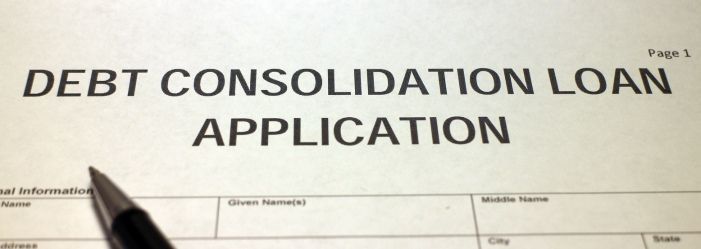Last Updated: November 14, 2023
Learn what Debt Consolidation can do for you

There are several different ways to get out of debt including do-it-yourself, bankruptcy, debt settlement, and debt consolidation. Each method has its upsides and its downsides including credit score damage/improvement, costs, and efficacy.
In this article, we will cover debt consolidation and the pros and cons of debt consolidation.
What is Debt Consolidation?
In debt consolidation, you take out a loan and pay off all debts. You then pay off the loan. Debt settlement involves negotiating with creditors to lower your payments; bankruptcy is a court-based elimination of all debt, and do-it-yourself is what you may have been doing.
Debt consolidation refers to combining multiple debts into one new loan or credit product with the goal of reducing interest rates and simplifying payments.
There are four types of debt consolidation loans. These are an unsecured personal loan, a zero-interest balance transfer credit card, a home equity loan, and a cash-out mortgage refinance.
An unsecured personal loan is based on your credit score and how much you want to borrow. The better your credit score, the lower your interest rate. You may be charged fees to take out a new loan and you may extend the time you have to repay the loan. Both of these will affect how much you end up paying in interest.
A zero-interest balance transfer credit card allows you to transfer a certain amount of debt to a credit card with no interest fees for a specific amount of time. You must know the amount you can transfer, the transfer fees, and how long the zero interest lasts.
In addition, know the post-introductory interest rate -- it may be more than your current rates. In addition, the penalties for missing a payment can be steep. If you can not pay off the card within the time period, avoid this loan.
A home equity loan is a secured loan that uses your house as collateral. With a home equity loan, you borrow against the equity (the value of the home minus the current mortgage) in your home. Interest rates are generally better than unsecured loans.
The biggest drawback is that your house is the collateral for the loan and you can lose your home if you default on your home equity loan.
The final loan is a cash-out refinance. In this loan, you add the amount of your bills to the equity of your house and take out a mortgage in that amount.
The extra cash is used to pay your debts. You want a shorter term than your existing mortgage has left and you want a lower interest rate.
For instance, if you have 10 years left on a mortgage, it does not make sense to take out a 30-year mortgage. You may get a lower interest rate, but there are many fees that come with refinancing and your home is the collateral for the loan.
Debt consolidation sounds very simple, but there are some pros and cons that you want to consider before you decide to get out of debt via debt consolidation.
Types of Debt Consolidation Services
- Unsecured personal loans - Based on your credit score, interest rate may be lower than current debts
- Balance transfer credit cards - Allow you to transfer debt to a new card with 0% intro APR
- Home equity loans - Use home as collateral, rates typically better than unsecured loans
- Cash-out mortgage refinance - Add debts to mortgage balance and refinance at lower rate
- Federal student loan consolidation - Combine federal student loans into one Direct Consolidation Loan
- Credit counseling agency debt management plans - Work with agency to consolidate debts and negotiate lower rates
- Medical bill consolidation programs
- Designed specifically for consolidating medical debts
How Do You Use Debt Consolidation?
Your first step is to write down all the debt you want to pay off. In general, you can include credit cards, car notes, utility bills, medical bills - almost anything. Include the creditor’s name, the amount owed, and the interest rate on your list.
Total up what you owe. If you can pay off this total in less than a year, debt consolidation is not a good option.
Your next task is to find a loan that covers your debt. Look at the interest rate and any fees like origination fees that the financial agency charges. Remember that your loan will be based on your credit score.
The higher your credit score, the lower your interest rate will be. Take time to shop around.
Next, add up all the bills with interest rates higher than the potential loans. Don’t include bills with lower interest rates - it doesn’t make sense to take out a loan with a higher rate to pay off lower rates!
Now, apply for the loan. Always know what you are getting. Pay off your debts as soon as the money hits your account. Otherwise, you may be tempted to spend it on something else.
Your final task is to pay off the loan and any other debts. Make sure you have a plan to stay out of debt in the future.
Debt Consolidation Pros and Cons
On the plus side, you have the following:
- Lower interest rate and thus lower interest payments
- One bill to pay instead of several
- Improves credit score very quickly
- May be able to pay off the debt consolidation loan more quickly
On the negative side you should consider the following:
- Home equity loans and cash-out mortgage refinancing put your home at risk if you default on the loan
- Balance transfer cards can have high-interest rates once the introductory period ends
- Transfer fees and missed payment penalties on a balance transfer card can be expensive
- Your debt consolidation loan may come with fees
- A lower credit score can result in higher interest rates
- You may be in debt longer or pay more interest
Should You Consolidate Your Debts?
Debt consolidation is worth looking at if:
- you can get a lower interest rate
- you have a plan to stay out of debt
- You can pay off the debt consolidation loan more quickly
What About Consolidating Student Loans?
If you have private student loans from several places, you may want to consolidate them into one loan. As with all debt consolidation, know what terms and interest rates you are getting.
Compare them to what you have now. If it is not better, it is not worth consolidating. Look for the following:
- No cost to consolidate
- Fixed interest rate
- Lower interest rate than you currently have
- Same or shorter repayment period
If you can not get all of these, avoid debt consolidation. If you have federal student loans, there are programs offered by the federal government to help you pay off loans. Don’t trade in your federal student loans for a private loan.
Does Debt Consolidation Hurt My Credit Score?
It can. On the plus side, you bring bills to current status and pay them off. This improves your debt to income ratio. On the negative side, your credit score is partially based on the age of your debt - the older the better - and paying off all those debts can hurt.
However, eliminating debt and staying out of debt is good for your credit score overall. What will hurt your credit score the most is if you just acquire more debt and miss payments.
Credit scores are based on five factors. These are repayment history, types of loans, length of credit history (age), new credit applications, and amounts owed. The two most important are your repayment history and the amount owed.
At 65% of your credit score, paying bills on time and decreasing what you owe is the most important. Debt consolidation will improve these. If you close every revolving debt (credit card) on your account, you will hurt your score a bit.
Leave them open but DO NOT use them and it will not have as big an impact on your score.
The last two, new credit applications and types of credit, represent 20% of your score. Do not apply for new credit and you avoid the first.
As for types of credit, most people have a mix to start - car, student loan, credit card, and possibly a mortgage but definitely rent - so that will not affect your credit score very much to pay off a few of them.
Overall, if done with a plan to stay out of debt and pay bills on time, debt consolidation can get you on a sounder financial footing.
Learn more by reading the article How Does Debt Consolidation Affect Your Credit Score.
Alternatives to Debt Consolidation
Other options beyond debt consolidation to consider:
- Balance transfer credit cards - Move debt to a 0% APR card
- Debt management plan - Work with credit counseling agency to consolidate and lower rates
- Debt settlement - Negotiating directly with creditors for lower payoff amount
- Credit counseling - Get guidance on managing debts from non-profit agency
- Bankruptcy - Court-supervised process to eliminate debts
Evaluate interest savings, fees, risks and your unique situation before choosing debt consolidation. Also have a plan for addressing overspending, or you risk racking up new debt.
FAQs
Conclusion
Debt consolidation can be an effective way to roll your debt into one simple payment. However, debt consolidation is not the answer to every debt situation. If you have no plan to stay out of debt, you will just rack up the debt again.
If you are not careful about what method of debt consolidation you use, the fees and interest charges may cost more than you save.
Before you use that balance transfer offer or take out a home equity loan, make certain you understand what those options will cost. They are not free and the fees may eat up any savings you could see.
In addition, anything that uses your home as equity puts you in jeopardy of losing your home. Do the research and write down everything so you know what you are getting into. And finally, make a plan to stay out of debt in the future.
If you are struggling with overwhelming debt and want to explore your debt relief options, Pacific Debt Relief offers a
free consultation to assess your financial situation. Our debt specialists can provide objective guidance relevant information and support to help find the right debt relief solution.
✔ Accredited by Better Business Bureau with BBB A+ rating (4.93 rating and 1678 reviews)
✔ US News and World Reports and Bankrate ranked Pacific Debt Relief as one of “The Best Debt Relief Companies of 2024”
✔ 6.9 star rating by BestCompany.com (over 2379 client reviews)
✔ 4.8 star rating by TrustPilot based (over 1613 verified consumer reviews)
✔ ConsumerAffairs.com Accredited (over 544 verified reviews with an average rating of 5 stars)
✔ A Top 10 Rated Compan by TopTenReviews.com , ConsumersAdvocate.com and Top10debtconsolidation.com
✔ 4.6 star rating by Google (229 client reviews)
✔ 100% rating by SuperMoney (9 client reviews)
Reduce Your Credit Card Debt By Up to Half

BBB Reviews | 4.9/5.0 Rating









 Do Not Sell My Personal Information
Do Not Sell My Personal Information